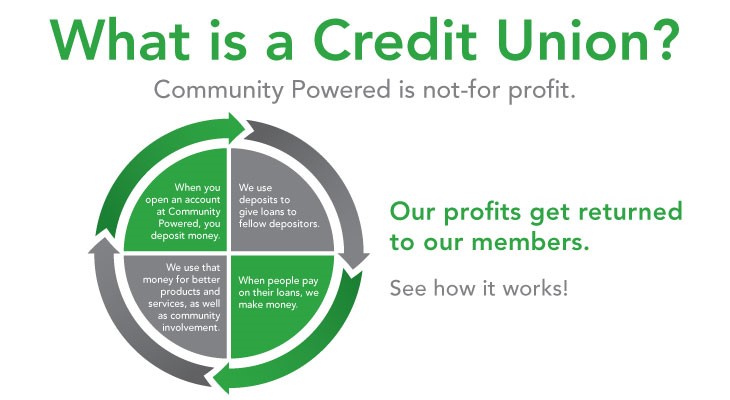Wyoming Credit Union: Trusted Financial Solutions for every single Demand
Wyoming Credit Union: Trusted Financial Solutions for every single Demand
Blog Article
The Ultimate Guide to Understanding Lending Institution

Credit history unions stand as one-of-a-kind monetary entities, rooted in principles of shared support and member-driven operations. As we browse via the ins and outs of debt unions, an insightful trip waits for to shed light on these member-focused institutions and how they differ from traditional financial institutions.
What Are Cooperative Credit Union?
Credit rating unions are member-owned banks that use a variety of banking services to their members. Unlike typical financial institutions, lending institution run as not-for-profit organizations, suggesting their key emphasis is on serving their members instead of taking full advantage of profits. Participants of a lending institution normally share a common bond, such as helping the very same company, belonging to the same area, or becoming part of the same company.
Among the essential advantages of cooperative credit union is that they typically offer higher rates of interest on savings accounts and lower rates of interest on financings compared to financial institutions. Federal Credit Union. This is because debt unions are structured to benefit their participants straight, allowing them to hand down their earnings in the type of far better rates and fewer charges. In addition, cooperative credit union are understood for their individualized customer service, as they focus on constructing relationships with their members to comprehend their unique financial requirements and objectives
Background and Evolution of Cooperative Credit Union
The origins of member-owned financial cooperatives, known today as lending institution, trace back to a time when areas sought options to standard banking organizations. The principle of credit unions come from the 19th century in Europe, with Friedrich Wilhelm Raiffeisen commonly attributed as the leader of the participating financial movement. Raiffeisen founded the first recognized lending institution in Germany in the mid-1800s, stressing area assistance and self-help concepts.
The advancement of credit unions continued in North America, where Alphonse Desjardins developed the initial cooperative credit union in copyright in 1900. Shortly after, in 1909, the very first united state lending institution was created in New Hampshire by a team of Franco-American immigrants. These very early credit report unions run on the essential principles of mutual aid, autonomous control, and participant ownership.
In time, cooperative credit union have grown in appeal worldwide because of their not-for-profit structure, concentrate on offering participants, and providing competitive economic product or services. Today, credit scores unions Federal Credit Union play a vital duty in the monetary industry, providing obtainable and community-oriented banking options for services and individuals alike.

Membership and Qualification Standards
Subscription at a credit rating union is generally restricted to individuals meeting specific qualification standards based on the establishment's starting principles and regulatory requirements. Some credit scores unions may just offer people who live or work in a certain location, while others may be tailored to staff members of a particular business or members of a specific association.
Additionally, cooperative credit union are structured as not-for-profit companies, suggesting that their main goal is to offer their participants instead of generate earnings for shareholders. This concentrate on participant service frequently converts right into more personalized attention, reduced fees, and competitive rate of interest on financial savings and fundings accounts. By meeting the qualification requirements and becoming a participant of a cooperative credit union, individuals can access a variety of financial services and products customized to their particular demands.
Services and Products Provided
Among the essential facets that sets lending institution apart is the varied variety of monetary solutions and products they use to their members. Cooperative credit union usually give conventional financial services such as cost savings and checking accounts, finances, and charge card. Members can likewise benefit from investment services, consisting of retired life accounts and financial preparation aid. Numerous lending institution provide affordable rates of interest on interest-bearing accounts and loans, in addition to reduced costs contrasted to traditional banks.
Additionally, cooperative credit union often provide convenient online and mobile banking options for participants to conveniently manage their finances. They may offer rewards such as common branching, enabling participants to access their accounts at other cooperative credit union throughout the country. Some credit scores unions also give insurance policy items like home, car, and life insurance coverage to help members shield their properties and liked ones.

Benefits of Banking With Cooperative Credit Union
When taking into consideration monetary establishments, exploring the benefits of financial with credit score unions reveals special benefits for participants looking for customized service and affordable rates. Unlike huge financial institutions, credit rating unions are member-owned and prioritize building solid relationships with their participants. Generally, banking with a credit union can offer a much more individualized, cost-effective, and member-centric monetary experience.
Conclusion
In conclusion, credit report unions stand out as member-owned economic institutions that prioritize offering their participants over maximizing revenues. With beginnings dating back to 19th century Europe, debt unions follow principles of shared help and participant possession.
Credit scores unions are member-owned monetary establishments that supply an array of banking services to their members. The concept of credit history unions stem in the 19th century in Europe, with Friedrich Wilhelm Raiffeisen usually attributed as the leader of the participating financial movement.The evolution of credit scores unions continued in North America, where Alphonse Desjardins established the very first credit history union in copyright in 1900. Credit score unions commonly provide traditional financial solutions such as financial savings and examining accounts, financings, and credit cards.When considering economic establishments, discovering the benefits of banking with credit history unions exposes distinct benefits for participants looking for customized service and affordable prices.
Report this page